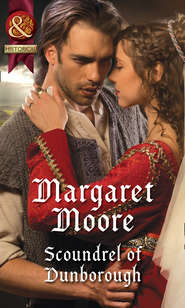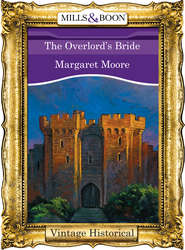По всем вопросам обращайтесь на: info@litportal.ru
(©) 2003-2024.
✖
The Baron's Quest
Настройки чтения
Размер шрифта
Высота строк
Поля
The baron slowly turned on his heel, surveying the buildings as if he were a merchant here to offer the cheapest price, and Gabriella remembered exactly why he had come.
As she looked at the buildings around her, her heart filled with pride at this monument to her parents, nearly overpowering the pain that one such as the Baron DeGuerre would be the possessor of it. Surely he would not care about this place beyond its strength as a fortress.
But there were other strongholds as well built. What was unique about Castle Frechette was its beauty. Her father had not been content with Norman utility when it came to his home; he had decorated and embellished wherever possible and insisted upon the finest materials. The stone frames of all the doors and archways were wonderfully carved, and even the simple stone hearth in the kitchen had been decorated with the shapes of fruit and braided loaves of bread. The chapel in the north tower boasted a lovely stained glass window, and her father’s solar in the south tower had three of plain glass. The apartments above the great hall were spacious and paneled with oak. The walls of the hall had been plastered and painted, so that even without tapestries, they were glorious to behold. All of the outer stones of the castle had been whitewashed with lime and today they gleamed in the September sunlight like the lovely marble used to pave her parent’s bedchamber.
Before she could look away, the baron’s gaze fastened upon her. Her breath caught in her throat, and her limbs seemingly turned to stone, although his face betrayed neither pleasure nor displeasure, pride nor scorn—indeed, she had never seen an expression so unreadable. He simply stared, his long hair and ankle-length tunic stirring slightly in the breeze.
She was the daughter of an earl, she reminded herself, so she stared back indignantly even as a heated blush flooded her face and warmed her body.
Without a change in his expression, Baron DeGuerre pivoted and continued his survey of the castle.
She had harbored a hope that the rumors about Baron DeGuerre were exaggerated and that she would be able to ask this man to allow her to stay in the only home she had known. In her most desperate fancies, she had even dared to imagine that he would welcome her superior knowledge of the castle, the land and the tenants.
She knew now, and with more disappointment than she cared to acknowledge, that these hopes had been completely ludicrous.
In a deep, dispassionate voice, the baron began to issue orders to the servants, grooms and squires to stable the horses and unload the wagons As he did so, she forced herself to look at the others in his retinue with the same impartial scrutiny with which he had regarded her home, and her.
There were several knights, some clearly more important than others, and it was to the two pairs riding nearest to the baron that she gave her closest attention. The first twosome was composed of a sleek, dark-haired man who also wore his hair long, but unlike the baron, it was brushed back from his high, pale forehead. He had what could have been a handsome face, except that his eyes were narrow and shifty as a ferret’s, overshadowed by heavy dark brows. As for his smile, it was a scornful, arrogant, sneering slash. His clothing and accoutrements were very fine, and she wondered if his favored position in the retinue meant he had influence with the baron. Woe betide her tenants if he did!
Beside this man, however, and in contrast to him, rode a blond-haired, merry individual in a tunic of very bright scarlet. At first sight, Gabriella thought him little more than a youth. When he dismounted and moved closer, she discerned subtle wrinkles around his mouth and eyes, and guessed that he was nearly of an age with the baron himself.
Gabriella found this man’s presence comforting. If the baron was as evil as men claimed, would such a pleasant-faced man be in his service? Or perhaps any man of Baron DeGuerre’s power and reputation would attract many followers, both good and bad.
Behind these two rode a pair of young knights. One was a slender, thoughtful-looking fellow, the other big and brawny. When they conversed, it was through the simplest of words and gestures, as if they had been friends for so long, nothing else was necessary.
Then Gabnella saw the woman who had to be Lady Josephine de Chaney. She was astonishingly beautiful, with a heart-shaped face and a perfect complexion, her pale, smooth cheeks having a very slight tint of pink; large green eyes fringed with incredibly lengthy lashes; rosy, full lips; delicately arched brows that were slightly darker than her blond hair; and a long, slender neck. She wore a cloak of rich blue and a headdress that sparkled in the sunlight over her bountiful blond hair. It was no wonder songs had been composed celebrating her classic beauty and graceful deportment, and that men had died vying for her love.
Gabriella smoothed down her simple brown homespun gown, and for an instant wished she had not sold all her fine dresses. But that was a vain thought, unworthy of her, and one quickly subdued.
Her self-evaluation was interrupted by the baron’s quiet yet commanding voice, which carried to every corner of the ward. “Where are the late earl’s children?” he demanded.
Now it comes, Gabriella thought. If only Bryce were here beside her instead of somewhere in Europe, ignorant even of their father’s death. Surely her brother would have been able to prevent this terrible situation. Or if not prevent, delay by going to the king himself when the true state of her father’s treasury became known as he lay dying. Instead, there had been no time, and no money to send another to intercede for her.
Gabriella blinked hard to subdue the weakness of tears and raised her chin, gazing upward at the soaring walls and battlements of her family’s home. She alone represented her family now, and she alone stood between her people and the Baron DeGuerre. She would not be afraid of an immoral, ambitious parvenu.
“I am Lady Gabriella Frechette,” she announced, slowly moving toward him and curtsying. “I bid you welcome.”
Etienne DeGuerre had many years of practice in masking his emotions, so now he easily kept the surprise from his face. He had noticed the young woman standing among the servants, of course. He had been struck by her uniqueness immediately: her steadfast gaze, which conveyed an attitude of strength at odds with the softness of her other features that made her pretty, her face surrounded by its dark corona of thick, wavy hair, and the simple gown that did more to emphasize her bountiful natural gifts than the finest garment might have. He had thought her a maidservant, possibly another example of the luxuries the late, profligate Earl of Westborough had enjoyed.
He should have noticed the proud, graceful carriage of a woman raised in wealth, a poise undiminished by the recent unfortunate events. He never should have surmised that since the earl’s daughter was unmarried, she was a child.
Her voice was also curiously intriguing, for it was low for a woman, even husky. No simpering, breathy helpless tone to her words, but an almost masculine forthrightness that was most unusual.
Etienne DeGuerre had met very few members of the female sex who impressed him, and those who did so usually had outstanding physical beauty, like Josephine. In all of the baron’s experience, there had been only two others who seemed to possess such calm determination and confident self-possession as this young woman. One had been his mother. The other was the new wife of his trusted liegeman, Sir Roger de Montmorency.
Nevertheless, Etienne’s expression did not alter as he magnanimously ignored her impertinence and walked toward her. “Where is your brother?”
“I wish I knew,” she retorted bluntly, “for he would not have allowed this to happen.”
Etienne halted. For years no one had had the effrontery to talk to him in such a manner, or use such a tone.
Then Gabriella Frechette made another mistake, for she obviously took the baron’s silence as an opportunity to continue. “Have you not forgotten something, such as the simple courtesy of a greeting or an expression of sympathy for my father’s demise?” she asked with a scornful politeness. “Or perhaps a thanks for how his untimely death has enriched you?”
For a brief instant, indignation raged through Etienne with the speed and fierceness of a summer’s grass fire. His emotional response was quickly quelled, however, and none of that indignation showed on his face. Instead he regarded her impartially with the coldly measuring stare that had made many a brave knight cower before him, a look that came from the knowledge that he had seen, done, experienced and survived more than most men had or ever would.
Gabriella Frechette did not flinch under his scrutiny. She did not start to weep. She did not even lower her eyelids. She simply stood there and faced him.
Etienne was not often confounded, and he did not like the sensation now. Either Gabriella Frechette was a stupid, foolish woman ignorant of the true meaning of her reduced status, or she had the spirit to maintain her personal dignity in spite of it.
Then, out of the corner of his eye, Etienne saw the mocking scorn of Philippe de Varenne’s smirk. Sir George de Gramercie, conspicuous in his customary scarlet, was simply and understandably studying the woman and finding her fascinating. Donald Bouchard, whom Etienne always thought of as “the monk,” was patiently waiting to see what would happen next; his friend, the stolid Seldon Vachon, was openly shocked. The castle inhabitants were unabashedly staring.
Suddenly he knew that this one lone woman represented a threat to his authority here. But Gabriella Frechette’s father had lost this estate by spending too freely on frivolities, and by raising a quarrelsome son who had argued and run away. He was not in the wrong to accept his reward. She was in the wrong to stay. She must be made to see that she was no longer the lady of the manor, just as he had to make clear to the rest of the servants that he would brook no disobedience or rebellion of any kind.
He considered his opponent, knowing not every weapon need be held in the hand. For a woman as proud as she, the best attack would surely be humiliation. Strangely and most unusually, he felt a twinge of regret that it must be so. But it was. He had fought and sacrificed too long to have his power corrupted in any way, by anyone.
“What are you doing here?” he asked with the dispassionate calm his enemies had come to fear.
The wary servants and tenants shifted uneasily and exchanged anxious whispers. Etienne noticed that Josephine, standing off to one side waiting patiently, looked at the young woman with sympathy in her lovely eyes. Philippe de Varenne no longer smiled, and Sir George was, for once in his life, looking grave. Donald and Seldon wisely went about their business.
“This is my home,” the late earl’s daughter answered.
“Not anymore,” he replied quietly. Very quietly.
There was a flash of grudging acknowledgment in her eyes, and a deep flush spread over her smooth cheeks. Etienne realized he had achieved a measure of triumph over her, yet did not feel overly triumphant. Well, it was never as enjoyable defeating a woman in a battle of words.
“My lord, if you will excuse me,” Sir George said with very slight reproach in his usually merry eyes, “I will assist your lady with her goods.”
“As you wish,” Etienne replied, telling himself George’s disapproval was nothing, and Josephine should see to making their bedchamber a comfortable haven. With a silent curtsy, Josephine took George’s arm and walked toward the large building that had to be the hall. Others in his retinue took their cue from them and sauntered away, all except Philippe de Varenne.
“Where is the bailiff?” Etienne demanded, momentarily ignoring Gabriella Frechette.
A moon-faced man of short and stocky stature burst out of the remaining crowd like an arrow from a bow, bustling toward the baron with a curious mixture of humility, self-importance and fear. “I am Robert Chalfront, my lord,” he said in a rather high-pitched voice. “I have been the bailiff here for ten years.”
Etienne glanced at Gabriella Frechette. She did not like this man, although she was trying not to show any emotion at all.
Nevertheless, Etienne had spent years gauging reactions, so he was quite certain that she hated the bailiff. Yet he had been in her father’s employ for ten years. That was most interesting, and possibly another tool for him to use. “You may remain bailiff, Chalfront,” the baron announced, his decision made in that instant. “Your continued presence should ease the transition to my rule.”
A subdued murmur ran through the crowd, whether of approval or not, Etienne did not trouble himself to consider.
Chalfront did not stifle the relieved sigh that broke from his lips as he bowed to the baron. “I will serve you well, my lord. I give you my word. The reeve is here, my lord, and the woodward and the—”
“I expect nothing less than my due, from you or any of my people,” Etienne replied. “As for the reeve and the others, I will see them another day. Tell me about the late earl’s son.”
Her brown eyes gleaming with defiance, Gabriella Frechette stepped forward. “Baron, is this not an inappropriate place to discuss such matters?”
Etienne regarded the young woman with the mildest of disdain. “I do not recall addressing you.”
She flushed, and after a moment’s hesitation, looked down at the ground.











